直引变间引
直引变间引
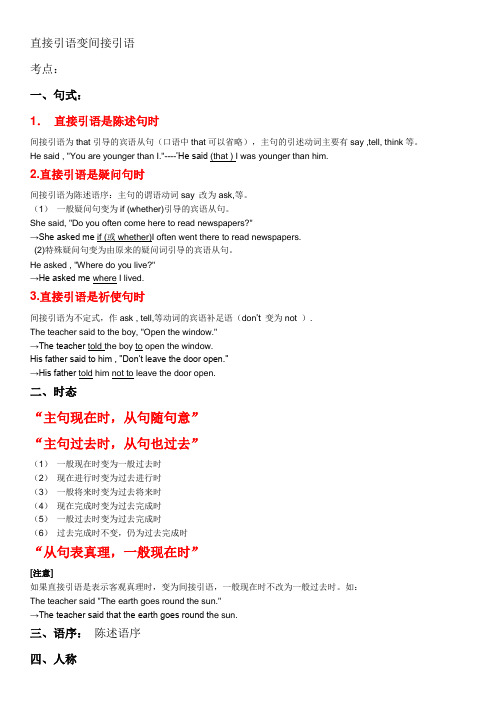
直接引语变间接引语考点:一、句式:1.直接引语是陈述句时间接引语为that引导的宾语从句(口语中that可以省略),主句的引述动词主要有say ,tell, think等。
He said , "You are younger than I."----’He said(that ) I was younger than him.2.直接引语是疑问句时间接引语为陈述语序:主句的谓语动词say 改为ask,等。
(1)一般疑问句变为if (whether)引导的宾语从句。
She said, "Do you often come here to read newspapers?"→She asked me if (或whether)I often went there to read newspapers.(2)特殊疑问句变为由原来的疑问词引导的宾语从句。
He asked , "Where do you live?"→He asked me where I lived.3.直接引语是祈使句时间接引语为不定式,作ask , tell,等动词的宾语补足语(don’t 变为not ).The teacher said to the boy, "Open the window."→The teacher told the boy to open the window.His father said to him , "Don’t leave the door open."→His father told him not to leave the door open.二、时态“主句现在时,从句随句意”“主句过去时,从句也过去”(1)一般现在时变为一般过去时(2)现在进行时变为过去进行时(3)一般将来时变为过去将来时(4)现在完成时变为过去完成时(5)一般过去时变为过去完成时(6)过去完成时不变,仍为过去完成时“从句表真理,一般现在时”[注意]如果直接引语是表示客观真理时,变为间接引语,一般现在时不改为一般过去时。
直引变间引
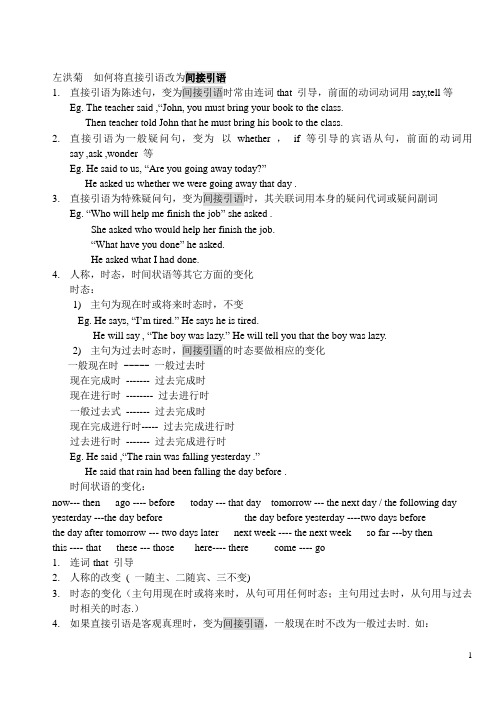
左洪菊如何将直接引语改为间接引语1.直接引语为陈述句,变为间接引语时常由连词that 引导,前面的动词动词用say,tell等Eg. The teacher said ,“John, you must bring your book to the class.Then teacher told John that he must bring his book to the class.2.直接引语为一般疑问句,变为以whether ,if 等引导的宾语从句,前面的动词用say ,ask ,wonder 等Eg. He said to us, “Are you going away today?”He asked us whether we were going away that day .3.直接引语为特殊疑问句,变为间接引语时,其关联词用本身的疑问代词或疑问副词Eg. “Who will help me finish the job” she asked .She asked who would help her finish the job.“What have you done” he asked.He asked what I had done.4.人称,时态,时间状语等其它方面的变化时态:1)主句为现在时或将来时态时,不变Eg. He says, “I‟m tired.” He says he is tired.He will say , “The boy was lazy.” He will tell you that the boy was lazy.2)主句为过去时态时,间接引语的时态要做相应的变化一般现在时----- 一般过去时现在完成时------- 过去完成时现在进行时-------- 过去进行时一般过去式------- 过去完成时现在完成进行时----- 过去完成进行时过去进行时------- 过去完成进行时Eg. He said ,“The rain was falling yesterday .”He said that rain had been falling the day before .时间状语的变化:now--- then ago ---- before today --- that day tomorrow --- the next day / the following day yesterday ---the day before the day before yesterday ----two days beforethe day after tomorrow --- two days later next week ---- the next week so far ---by thenthis ---- that these --- those here---- there come ---- go1.连词that 引导2.人称的改变( 一随主、二随宾、三不变)3.时态的变化(主句用现在时或将来时,从句可用任何时态;主句用过去时,从句用与过去时相关的时态.)4.如果直接引语是客观真理时,变为间接引语,一般现在时不改为一般过去时. 如:The teacher said “ The earth goes round the sun .”→The teacher said that the earth goes round the sun.1.He said , “ I like it very much .”He said that _____ liked it very much.2.He said to me ,“ I‟ve left my book in your room .”He told me that _______ had left _______ book in ______ room.3.He said ,“ I …m using the knife.”He told me that he ______ _______ the knife .4.She said that , “ I have not heard from him since May .”She said that _______ ________ __________ from him since May .5.H e said , “ I saw her in the street .”He said that he _______ ________ her in the street.6.He said , “ I had finished my homework before supper .He said that he _______ _______ his homework before supper.7.Zhou Lan said , “ I‟ll do it after class.”Zhou Lan said that he _______ _______it after class .8.He said , “ Light travels much fast than sound .” He said that ____ ____ much faster than sound .9.Our geography teacher said to us , “ The sun rises in the east and it sets in the west .”Our geography teacher told us that ________________________________________.10.My history teacher taught us , “The People‟s Republic of China was founded in 1949.”My history teacher taught us that ___________________________________________.11.He said , “ These books are mine .” He said that ____ books were his.12.He said , “ My sister was here three days ago .”He said that his sister had been there three days ________ .13.She said , “ I went there yesterday .”She said that she had gone there _______ _______ _______ .14.She said , “ I‟ll go there tomorrow .”She said that she would go there ______ ______ _____ .15.She said , “ I came here to see the doctor the day before yesterday .”She said that she _________ ________ __________ to see the doctor_______ ________ _______.16.She said, “I will come here this evening .”She said that she would _______ ______ ______evening17.He said , “ I am going there tomorrow .” He said that he was going ________ _________ ______.。
直引变间引,被动语态
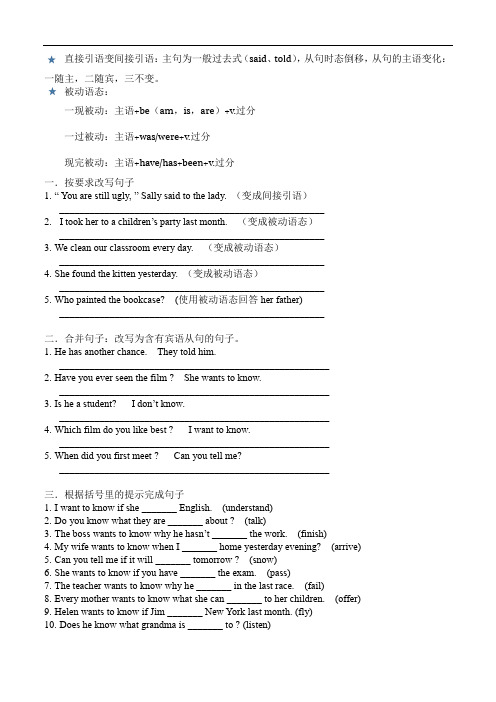
直接引语变间接引语:主句为一般过去式(said、told),从句时态倒移,从句的主语变化:一随主,二随宾,三不变。
被动语态:一现被动:主语+be(am,is,are)+v.过分一过被动:主语+was/were+v.过分现完被动:主语+have/has+been+v.过分一.按要求改写句子1.“ You are still ugly, ” Sally said to the lady. (变成间接引语)_____________________________________________________2.I took her to a children’s party last month. (变成被动语态)_____________________________________________________3.We clean our classroom every day. (变成被动语态)_____________________________________________________4.She found the kitten yesterday. (变成被动语态)_____________________________________________________5.Who painted the bookcase? (使用被动语态回答her father)_____________________________________________________二.合并句子:改写为含有宾语从句的句子。
1.He has another chance. They told him.______________________________________________________2.Have you ever seen the film ? She wants to know.______________________________________________________3.Is he a student? I don’t know.______________________________________________________4.Which film do you like best ? I want to know.______________________________________________________5.When did you first meet ? Can you tell me?______________________________________________________三.根据括号里的提示完成句子1.I want to know if she _______ English. (understand)2.Do you know what they are _______ about ? (talk)3.The boss wants to know why he hasn’t _______ the work. (finish)4.My wife wants to know when I _______ home yesterday evening? (arrive)5.Can you tell me if it will _______ tomorrow ? (snow)6.She wants to know if you have _______ the exam. (pass)7.The teacher wants to know why he _______ in the last race. (fail)8.Every mother wants to know what she can _______ to her children. (offer)9.Helen wants to know if Jim _______ New York last month. (fly)10.Does he know what grandma is _______ to ? (listen)四.选词填空what if there got lazy1.She didn’t say _______ her mother was at home.2.Do you know when Tom _______ up this morning.3.Can you tell me _______ you hear ?4.I want to know if you will be _______ tomorrow.5.His wife wants to know why he is so _______.五、将下列句子变成被动语态1.Tom broke the glass just now.2.He invited me to the party.3.Somebody cleaned the room yesterday.4.They water these flowers every day.5.We have emptied the baskets. ()六、单项选择1.What language in America?A. speakB. spokeC. spokenD. is spoken2.They to clean the classroom yesterday.A. are askedB. were askedC. askedD. Ask3 .This kind of flower must every day.A .water B.be watered C .watered D .watering4 .This kind of bike in Tianjin.A .is madeB .makesC .is makingD .made。
直接引语和间接引语

一、直接引语变间接引语a.陈述句的间接引语直接引语是陈述句,变为间接引语时,在多数情况下都构成一个that引导的宾语从句,引述动词通常是say, tell等。
与此同时,间接引语中的人称、时态和其他方面也要相应有所变化。
b.疑问句的间接引语1.一般疑问句和反意疑问句you haven't been to beijing, have you asked he. 他问:你没去过北,是吗?2.否定的一般疑问句和选择问句do you like this one or that one tom asked. 汤姆问:你是喜欢这个还是那个?3.特殊疑问句间接引语为特殊疑问句时,间接引语前仍然用特殊疑问词作为连词引导宾语从句,注意从句必须用陈述语序,主句谓语动词常用ask。
4.其它英语中有些疑问句并非提出疑问,而是表示请求、劝告、建议等。
这种疑问句变为间接引语时,往往采用其他的形式。
①.suggest doinghe suggested having a drink. 他建议喝一杯。
②.advise sb to dojames advised me to go hiking. 詹姆士建议我去徒步旅行。
③. offer to dohe offered to ost the letter. 他主动提出寄信。
④.ask sb to doshe said to me, please have a rest. 她对我说:请休息一下。
→ she asked me to have a rest. 她要求我休息一下。
2.带有let的祈使句(表示请求,建议或命令),可用suggest + -ing形式或suggest +that 从句来表示其相应的意思。
d.感叹句的间接引语2.有些感叹句可以根据原句的意思,采用适当的动词变为陈述句,不需用间接宾语来转述。
二、间接引语中的词语变化直接引语变为间接引语时,间接引语中的动词时态、人称代词、物主代词、指示代词、时间和地点状语以及主谓语词序往往要作相应的变化。
(推荐)Lesson133直引变间引新概念一

• Let’s buy a newspaper, Liz. • Let’s buy= Let us buy. • Let’s go swimming!
• Listen to this! • listen to 听,表听的动作 • listen不及物动词,接宾语时必须加介词,构
成及物动词短语。 • 听,这是什么声音?你能听到吗? • Listen! What's that noise? Can you hear it?
• 'Karen Marsh: Sensational News! • By our reporter, Alan Jones. • by表示动作的执行者,意为“由….”或“被…” • 培根写的一本书 a book by Bacon
• Karen Marsh arrived at London Airport today. • arrive at 到达,到达一个较小的地方 • arrive in 到达,到达一个较大的地方 I arrived in England on Friday. We first arrived at
• What are they doing? make a film
reporter n.
-er 后缀,表示人
-or, -ess(女) , -ee,
learner 学习者 doctor 医生 actress 女演员
teacher 教师
driver 司机
artist 艺术家 dentist 牙医
waitress 女服务员 visitor参观者
• dress “给…穿衣”,对象是人,而非衣物 • She dressed her baby first, and then dressed
直接引语和间接引语的变化规则
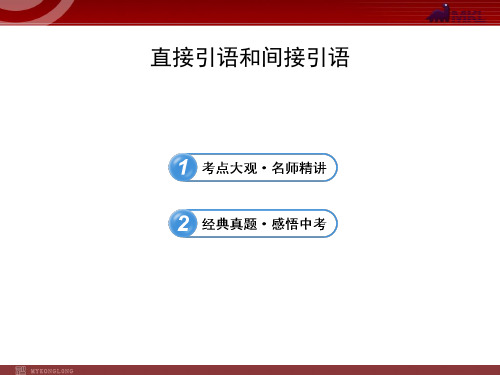
一、定义 直接引述别人的话,叫直接引语。被引用的部分放在引号 里。用自己的话转述别人的话,叫间接引语,间接引语不用引 号,在多数情况下是以宾语从句的形式出现。
二、直接引语和间接引语的变化规则 (一)人称的变化:一随主,二随宾,第三人称不更新
用法 举例
He said, “We love our country. ” 一随主 →He said that they love their country. 直接引语中的第 他说他们热爱自己的国家。 一人称根据间接 She said to me, “I have left my books in your room. ” 引语中的主语作 →She told me she had left her books in my room. 相应的变化 她对我说她把书落在我屋里了。
按要求改写句子
1. (2012· 安顺中考)“Jack, can you help with the dinner? ”Jack’s mother asked. (改成间接引语) Jack was asked ______ he ______ help with the dinner. 答案:if; could
(二)时态的变化
直接引语
间接 引语
例句
一般现在时
Tom said, “I usually get up at six. ”→Tom said (that) 一 般 过 去 he usually got up at six. 时 汤姆说他通常六点起床。
一般过去时
Mike told me, “I walked to school yesterday. ” 过 去 完 成 →Mike told me he had walked to school the day before. 时 迈克告诉我他昨天步行去上学的。
直引变间引的诀窍

直引变间引的诀窍----语法课专用周一语法班专用!!!一、如何变人称:“一随主。
二随宾,三不变”。
“一随主”是指在直引变间引时,如果从句中的主语是第一人称或被第一人称所修饰。
从句中的人称要按照主句中主语的人称变化如:She said. "My brother wants to go withme. "→She said herbrother wanted to go with her.“二随宾”是指直接引语变间接引语时,若从句中的主语及宾语是第二人称或被第二人你所修饰。
从句中的人称要跟引号外的主句的宾语一致。
如果引号外的主句没有宾语。
也可以用第一人称,如:He said to Kate. "How is your sisternow?"→He asked Katehow her sister was then。
“三不变”是指直接引语变间接引语时。
如果从句中的主语及宾语是第三人称或被第三人称所修饰从句中的人称一般不需要变化如:Mr Smith said。
"Jack is a good worker。
"→Mr Smith saidJack was a good worker。
二、如何变时态:直接引语在改为间接引语时、时态需要做相应的调整。
现在时它需改为过去时态;过去时态改为完成时;过去完成时则保留原来的时态。
如:1)She said. "I have lost a pen."→She said she had lost a pen.2)She said. "We hope so."→She said they hoped so.3) She said. "He will go to see hisfriend。
"→She said he would go to see hisfriend。
直接引语和间接引语-修订版-教师版

直接引语和间接引语引述某人的话一般采用两种形式:一种是直接引语(Direct Speech),即原封不动地引用原话,把它放在引号内;另一种是间接引语(Indirect Speech),即用自己的话加以转述,被转述的内容不放在引号内。
这两种引语主要体现在宾语从句或复合宾语(动词不定式)中。
直接引语改为间接引语时,应注意句式,人称,时态,指示代词, 主谓语词序,时间状语和地点状语的变化, 同时还应该注意方向性动词的变化。
(一) 句式的变化1.陈述句的间接引语直接引语是陈述句,变为间接引语时,在多数情况下都构成一个that 引导的宾语从句,that 可以省略。
引述动词通常是say, tell, repeat, answer, reply, explain, think, believe, suggest, advise等。
(1) “The body discovered in the snow on the border of Italy and Austria can tell us a lot about life thousands of years ago.” Archaeologists from Rome and Vienna say→ Archaeologists from Rome and Vienna say (that ) the body discovered in the snow on the border of Italy and Austria can tell us a lot about life thousands of years ago.(2) “There are so many exciting things to do in the youth hostel.” Tara said in her letter.→ In her letter, Tara said (that ) there were so many exciting things to do in the youth hostel.2.疑问句的间接引语直接引语为疑问句改为间接引语时,必须用陈述语序,句末用句号。
直引变间引bring改take——引语转换中动词变化的一个补充

,
.
。
,
,
.
,
.
。
,
.
,
.
。
,
,.,.。.、
,
.
。
.
.
。
:
。
。
一 51 一
, 。
e
.
”
,
。
。
。
:
,
“
r
.
”
,
、a
:
a
e
a
e
e
r
e
e
。
e
.
,
“
”
e
` ’
”
,
“
”
,
“
”
。
,
。
,
,
,
。
气
本社 现 有 如下 书 刊 ,二 9 8 7 年 l 3 期 2 19 9 一 年 I一 6 期
一
.
服
,
务
:
台
欢迎 邮购 每期 0 4 0 元 共 1 2 元 每期 0 7 0 元 共 月 2 0 元 , 19 92 年 I 12 期 (第 8 期 售 完 ) 每期 0 9 0 元 共 9 9 0 元 一 4 199” 2 期将 出 每期 。 9 1 0 8 年 一 日 期已出 0 元 全年共 1 0 元 5 本 刊 增 刊 ( 高考 会考 指南 ) 定 价 0 9 0 元 6 《 高 中英 语 标准化 阅 读 试 题 总 集 飞 一 本 ” 9 0 元 ( 含邮 资 ) 曰 6 00 1 大 连外 国 语 学院 《 英 语 知 识 》 杂志社 汇款 请寄 请在附言 内 说 明所 购书名 及 数量
,
直接引语和间接引语的相互转换

直接引语和间接引语的相互转换引述或转述别人的话称为“引语”。
直接引用别人的原话,两边用引号“ ”标出,叫做直接引语;用自己的语言转述别人的话,不需要引号这叫做间接引语,实际上间接引语大都是宾语从句(其中由祈使句转换的间接引语除外,其转换后是不定式)。
那么直接引语为陈述句、一般疑问句、特殊疑问句和祈使句,转换为间接引语时,句子的结构,人称、时态、时间状语和地点状语等都要有变化,如何变化呢?1、人称的转变1)直接引语中的第一人称,一般转换为第三人称,如:He said,“I am very sorry.” ——>He said that he was very sorry.2)直接引语中的第二人称,如果原话是针对转述人说的,转换为第一人称,如:“You should be more careful next time,” my father told me.——>My father told me that I should be more careful the next time.3)直接引语中的第二人称,如果原话是针对第三人称说的,转换成第三人称。
如:She said to her son, “I'll check your homework tonight.” ——>She said to her son that she would check his homework that night.4)人称的转换包括人称代词、物主代词和名词性物主代词等,如:He asked me, “Will you go to the station with me to meet a friend of mine this afternoon?” ——>He asked me whether I would go to the station with him to meet a friend of his that afternoon.总之,人称的转换不是固定的,具体情况,具体对待,要符合逻辑。
直接引语 间接引语
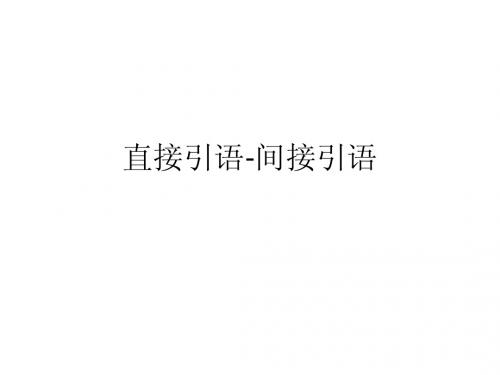
this these
He said he…
plays football is playing has played
played football
was playing had played had played
played
will play had played
would play
had played
一 随 主 二 随 宾
第三 人称 不变
He said to Lily, “ you must get up early.”
He told Lily that she must get up early.
引号内的第三人 称在变间引后人 称不变
She said to me , “ They want to help him.”
Indirect Speech
then
that day
the day before
that week/month
that week/month before
时间状语
last week/month three days ago
three days before
the next day/the following day there
Indirect Speech
She asked me whether\if I had seen the film. He asked John if\whether he was a doctor. She asked us where we were going to get off. He asked them who had given them a talk the day before.
直接引语与间接引语(带问题详解)
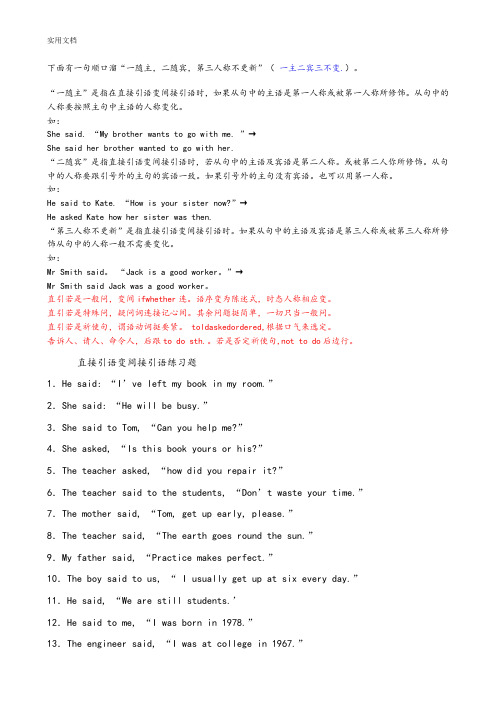
下面有一句顺口溜“一随主,二随宾,第三人称不更新”(一主二宾三不变.)。
“一随主”是指在直接引语变间接引语时,如果从句中的主语是第一人称或被第一人称所修饰。
从句中的人称要按照主句中主语的人称变化。
如:She said. “My brother wants to go with me. ”→She said her brother wanted to go with her.“二随宾”是指直接引语变间接引语时,若从句中的主语及宾语是第二人称。
或被第二人你所修饰。
从句中的人称要跟引号外的主句的宾语一致。
如果引号外的主句没有宾语。
也可以用第一人称。
如:He said to Kate. “How is your sister now?”→He asked Kate how her sister was then.“第三人称不更新”是指直接引语变间接引语时。
如果从句中的主语及宾语是第三人称或被第三人称所修饰从句中的人称一般不需要变化。
如:Mr Smith said。
“Jack is a good worker。
”→Mr Smith said Jack was a good worker。
直引若是一般问,变间ifwhether连。
语序变为陈述式,时态人称相应变。
直引若是特殊问,疑问词连接记心间。
其余问题挺简单,一切只当一般问。
直引若是祈使句,谓语动词挺要紧。
toldaskedordered,根据口气来选定。
告诉人、请人、命令人,后跟to do sth.。
若是否定祈使句,not to do后边行。
直接引语变间接引语练习题1.He said: “I’ve left my book in my room.”2.She said: “He will be busy.”3.She said to Tom, “Can you help me?”4.She asked, “Is this book yours or his?”5.The teacher asked, “how did you repair it?”6.The teacher said to the students, “Don’t waste your time.”7.The mother said, “Tom, get up early, please.”8.The teacher said, “The earth goes round the sun.”9.My father said, “Practice makes perfect.”10.The boy said to us, “ I usually get up at six every day.”11.He said, “We are still students.’12.He said to me, “I was born in 1978.”13.The engineer said, “I was at college in 1967.”14.He said, “I have studied English since I was a boy.”15.She said, “I read the book while I was waiting for a bus.16.Mr. Green said to them, “Joe told me all about his story when he asked for a job.”17.He said, “We insisted that she start immediately.18.She said, “He demanded that the girl leave at once.”19.I said to him, “I have finished it.”20.She said to us,“ I’ll come here tomorrow.”21.“Where does your chemistry teacher live, Karen?” the young man asked.22.“I have gained the first place in the mathematics competition,” the little boy said happily.23.“Light travels faster than sound,” the physics teacher said to the boys and girls.24.“Will you go to the concert with me this evening?” Mary asked me.25.“What did you do here yesterday?” the old man asked my brother.直接引语变间接引语专练题(二)Ⅰ.单项选择1. He asked ________ for the computer.A. did I pay how muchB. I paid how muchC. how much did I payD. how much I paid2. “Have you seen the film?” he asked me. →He asked me _______.A. had I seen the filmB. have I seen the filmC. if I have seen the filmD. whether I had seen the film3. “Please close the window,” he said to me.→He ______ me _____ the window.A. said to; to closeB. told to; closingC. asked ; to closeD. said to; please close4. “I am a teacher,” Jack said. →He said _________.A. that I am a teacherB. I was a teacherC. that he is a teacherD. he was a teacher5. He said, “Mother, the boy is very naughty.”→He _____- very naughty.A. said his mother that the boy wasB. said to his mother that the boy isC. told his mother that the boy wasD. spoke to his mother that the boy was6. “You’ve already got well, haven’t you?” she asked.→She asked ________.A. if I have already got well, hadn’t youB. whether I had already got wellC. have I already got wellD. had I already got well.7. He asked , “ Are you a Party member or a League member?”→He asked me _________.A. am I a Party member or a League memberB. was I a Party member or a League memberC. if I was a Party member or a League memberD. whether was I a Party member or a League member.8. He asked, “How are you getting along?”→He asked _______.A. how am I getting alongB. how are you getting alongC. how I was getting alongD. how was I getting along9. He asked me ________ with me.A. what the matter isB. what the mater wasC. what’s the matterD. what was the matter10. He said, “Don’t do that again.” He _____ me _______ that again.A. said to me; not to doB. said to me; don’t doC. told me; don’t doD. told me; not to do附答案:1. He told me that he had left his book in his room.2. She said that he would be busy.3. She asked Tom if /whether he could help her.4. She asked me whether that book was mine or his.5. The teacher asked me how I had repaired it.6. The teacher told the students not to waste their time.7. The mother asked Tom to get up early.8. The teacher said that the earth goes round the sun.9. My father said practice makes perfect.10. The boy told us he usually gets up at six every day.11. He said they are still students.12. He told me that he was born in 1978.13. The engineer said he was at college in 1967.14. He said he had studied English since he was a boy.15. She said she had read the book while she was waiting for a bus.16. Mr. Green told them Joe had told him all about his story when he asked for a job.17. He said they (had) insisted that she start immediately.18. She said he demanded that the girl leave at once.19. I told him I had finished it.20. She told us she would come here tomorrow21. The young man asked Karen where her chemistry teacher lived.22. The little boy said happily that he had gained the first place in the mathematics competition.23. The physics teacher told the boys and girls that light travels faster than sound.24. Mary asked me if / whether I would go to the concert with her that evening. 25. The old man asked my brother what he had done there the day before.答案与简析:1. D 宾语从句要用陈述句语序。
(完整版)英语语法如何把直接引语转换为间接引语
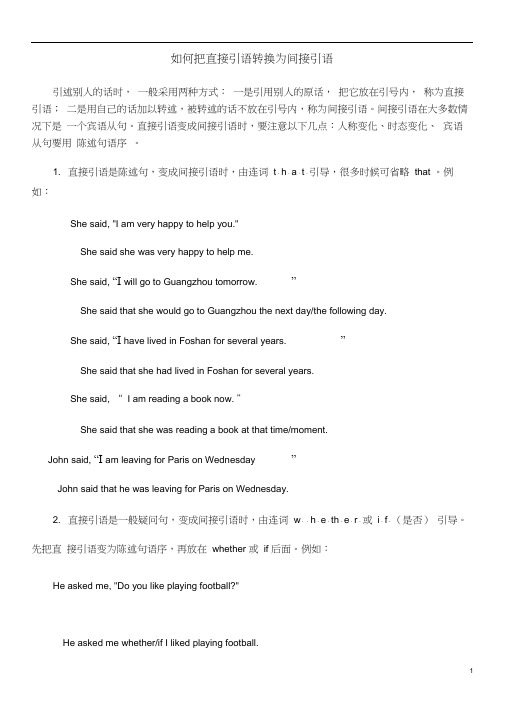
如何把直接引语转换为间接引语引述别人的话时,一般采用两种方式:一是引用别人的原话,把它放在引号内,称为直接引语;二是用自己的话加以转述,被转述的话不放在引号内,称为间接引语。
间接引语在大多数情况下是一个宾语从句。
直接引语变成间接引语时,要注意以下几点:人称变化、时态变化、宾语从句要用陈述句语序。
1. 直接引语是陈述句,变成间接引语时,由连词t.h.a.t.引导,很多时候可省略that 。
例如:She said, "I am very happy to help you."She said she was very happy to help me.She said, “I will go to Guangzhou tomorrow. ”She said that she would go to Guangzhou the next day/the following day.She said, “I have lived in Foshan for several years. ”She said that she had lived in Foshan for several years.She said, “ I am reading a book now. ”She said that she was reading a book at that time/moment.John said, “I am leaving for Paris on Wednesday ”John said that he was leaving for Paris on Wednesday.2. 直接引语是一般疑问句,变成间接引语时,由连词w..h.e.th.e.r.或i.f.(是否)引导。
先把直接引语变为陈述句语序,再放在whether 或if 后面。
例如:He asked me, "Do you like playing football?"He asked me whether/if I liked playing football.He asked Mary, “Will you come to my birthday party?You will come to my birthday party.He asked Mary whether/if she would come to his birthday party.注意:大多数情况下,if 和whether 可以互换,但后有or not, 或在动词不定式前,或放在介词后作连接词时,一般只用whether 。
新概念英语第一册第133135课语法直引变间引
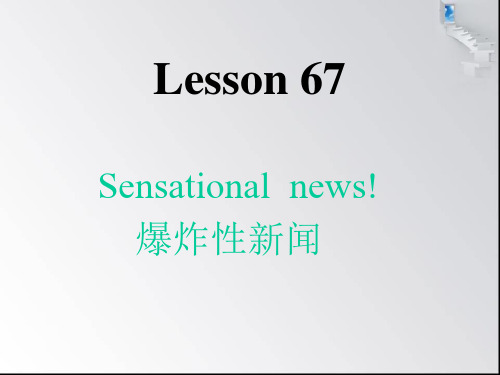
一般疑问句
用连词whether或if引导,原主句中谓语动词say 要改为ask ,语序要变为陈述语序
• He said, “Do you have any difficulty with pronunciation?”
train. • “Is he all right?”They cried out. • They cried out whether he was all right.
直接变间语中,要注意情太动词的变化 can – could
can’t – couldn’t will – would may – might
• You look great in the mink coat. • 你穿那件貂皮大衣看起来棒极了。
• wonder [‘wʌndə] v.1.感到好奇
•
2.感到惊讶
• I wonder why.
• 我想知道为什么。
• She wonders at his rudeness.
• 她对他的无礼感到惊讶。
Summary:
reporter sensational
mink coat wonderቤተ መጻሕፍቲ ባይዱ
直接引语变间接引语
1)人称的变化 一随主,二随宾,三不变
口诀
说明
直接引语
间接引语
一 随 主
引号内的第一人 称变间引后与主 句主语的人称保 持一致
She said,“ I like She said that she
直接引语变间接引语可分为三大类:
1)直接引语为陈述句 2)直接引语为疑问句(一般疑问句、特殊 疑问句) 3)直接引语为祈使句
直接引语与间接引语
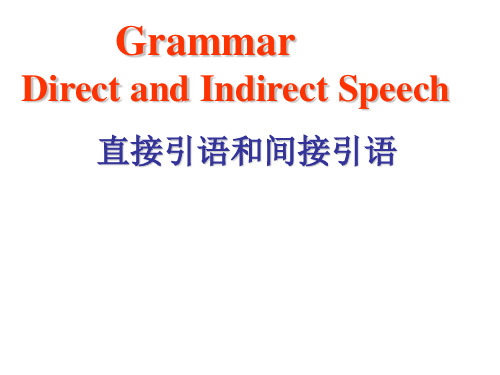
1)人称的变化
口诀 一 随 主 说明
引号内的第一人 称变间引后与主 句主语的人称保 持一致 引号内的第二人 称变间引后与主 句宾语的人称保 持一致
一随主,二随宾,第三人称不变更 直接引语 间接引语
She said,“ I like She said that she liked tennis Tennis.” He said to Lily, He told Lily that “ you must get she must get up up early” early She said to me , She told me that “ They want to That they wanted help him” help him
例句 直接引语转换 成间接引语时 直接引语 的时态变化 过去完成时 He said, “I had finished my 不变 homework before supper.” 一般将来时过去将来时
间接引语 He said that he had finished the homework before supper.
Exercises:
3语序;1转述动词+2引导词;(句式?) 4人称;5时态; ( 指示代词;时间;地点)
1) She said, “I passed this exam.” She said that she had passed that exam. 2) He said/asked, “Are you a teacher?” → He asked me if /whether I was a teacher. 3) She said , “What is he going to do tomorrow?” → She asked (me) what he was going to do the next day.
英语语法 直接引语和间接引语

直接引语和间接引语引用别人的话一般有两种方式,一种是直接引用别人的原话,并把它放在引号内,这叫 直接引语;另一种是用自己的话来转述别人的话,并且不能用引号,这就是间接引语。
间接 引语在许多情况下构成宾语从句。
“I want to buy a house in the country.” Jack said. 杰克说:“我想在乡下买座房子。
”(直接引语) Jack said that he wanted to buy a house in the country. 杰克他说他想在乡下买座房子。
(间接引语) 1. 直接引语变间接引语的七大变化 (1) 人称变化 下面有一句顺口溜“一随主,二随宾,第三人称不更新”。
① 一随主 是指在直接引语变间接引语时, 如果从句中的主语是第一人称或被第一人称所修饰。
从 句中的人称要按照主句中主语的人称变化。
She said. “My brother wants to go with me.” → She said her brother wanted to go with her. ② 二随宾 是指直接引语变间接引语时, 若从句中的主语及宾语是第二人称。
或被第二人称所修饰。
从句中的人称要跟引号外的主句的宾语一致。
如果引号外的主句没有宾语。
也可以用第一人 称。
He said to Kate. “How is your sister now?” → He asked Kate how her sister was then。
③ 第三人称不更新 是指直接引语变间接引语时,如果从句中的主语及宾语是第三人称或被第三人称所修 饰,从句中的人称一般不需要变化。
Mr. Smith said: “Jack is a good worker。
” →Mr. Smith said Jack was a good worker。
(2) 时态的变化 直接引语变为间接引语时, 若主句为过去时态, 变为间接引语的宾语从句通常要将时态 往后推一个。
直引变间引
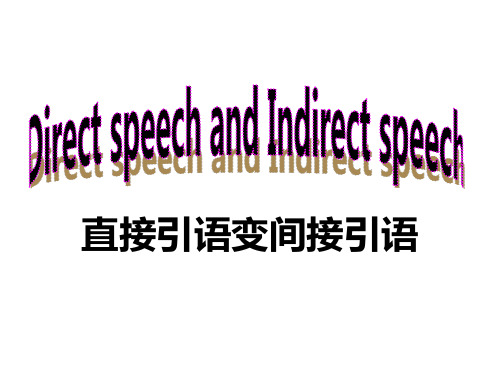
第一人称与主语的人称保持一致 简称:一随主 • He says, ' I will do it tomorrow.' • He says that he will do it tomorrow.
• She says,' I like tennis.' • She says that she likes tennis.
直接引语变间接引语
直接引语与间接引语的定义
直接引语: 直接引述别人的原话
He says, ’ I will do it tomorrow‘.
间接引语: 转述别人的话
He says (that) he will do it tomorrow.
间接引语在多数情况下构成宾语从句 引导词that 可以省略
• She says,' She likes tennis.' • She says that she likes tennis.
直接引语变间接引语人称变化
• 一随主 • 二随宾 • 三不变
Exercises
1. She says to me,' I will see you next week.' 2.Lucy says to Peter,'You must arrive home early.' 3.My brother says to me,'You need an X-ray.' 4.My sister says,' She feels tired.' 5.He says,'I will visit my daughter in March.'
主句是一般过去时,从句的时态要 做出相应的改变.
初高中衔接(直接引语与间接引语
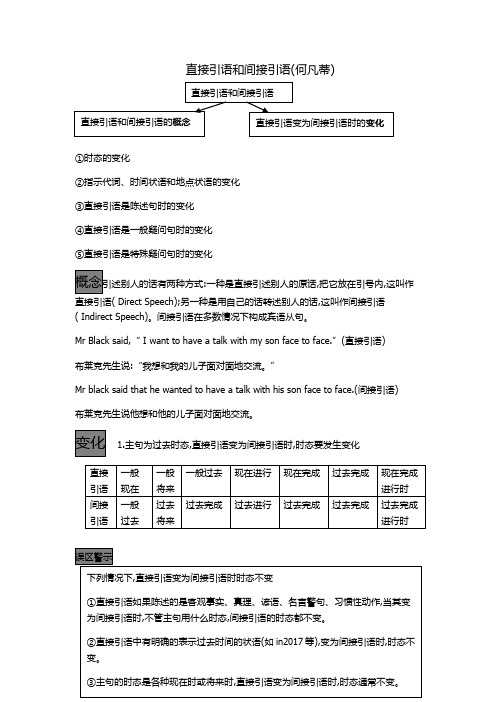
直接引语和间接引语(何凡蒂)①时态的变化②指示代词、时间状语和地点状语的变化 ③直接引语是陈述句时的变化 ④直接引语是一般疑问句时的变化 ⑤直接引语是特殊疑问句时的变化 :一种是直接引述别人的原话,把它放在引号内,这叫作( Direct Speech);另一种是用自己的话转述别人的话,这叫作间接引语( Indirect Speech)。
间接引语在多数情况下构成宾语从句。
Mr Black said,“ I want to have a talk with my son face to face.”(直接引语) 布莱克先生说:“我想和我的儿子面对面地交流。
”Mr black said that he wanted to have a talk with his son face to face.(间接引语) 布莱克先生说他想和他的儿子面对面地交流。
主句为过去时态,直接引语变为间接引语时,时态要发生变化2.人称在间接引语中的变化直接引语中的人称代词在转化为间接引语时,也要有相应的变化。
一般遵循“一随主,二随宾,第三人称不更新”的原则。
1.指示代词、时间状语、地点状语、动词在间接引语中的变化动词 come - go bring - take4.句子结构的变化(1)直接引语是陈述句,变为间接引语时,用连词that引导(that在口语中常省略),从句中的人称、时态、指示代词、时间状语、地点状语做相应变化。
“I'll talk with him face to face this evening, “she said to me.She told me that she would talk with him face to face that eveningMr Black said, "I packed my suitcase yesterday afternoon.”- Mr Black said( that) he had packed his suitcase the previous afternoon.(2)直接引语是一般疑问句,变为间接引语时,用 whether或if引导,疑问语序为陈述语序,同时人称、时态、时间状语、地点状语做相应变化。
- 1、下载文档前请自行甄别文档内容的完整性,平台不提供额外的编辑、内容补充、找答案等附加服务。
- 2、"仅部分预览"的文档,不可在线预览部分如存在完整性等问题,可反馈申请退款(可完整预览的文档不适用该条件!)。
- 3、如文档侵犯您的权益,请联系客服反馈,我们会尽快为您处理(人工客服工作时间:9:00-18:30)。
直接引语与间接引语的形成
一、直接引语:当我们引用别人的话语时,若引用的是原话,被引用的部分叫做直接引语。
形成:1、这时只需将原话放在引号之中,不做任何更动
2、没有时态呼应的问题
3、引用原话前可以用“,”
4、第二个引号之前,亦即重复的话之末,按其类别放一个句号“。
”或问号“?”
e.g. She said,“I like English very much.”
或“I like English very much.”,she said.
二、间接引语:当我们要引用别人的话语时,可以用自己的话把意思转述出来,这种转述的别人说话的部分叫做间接引语。
形成:1、不要逗号、引号
2、要考虑到人称的变化(人称的变化与汉语一致)
3、要考虑时态变化
4、要考虑时间状语、地点状语和指示代词变化
e.g. She said,“I like English very much.”直引
She said she liked English very much. 间引
直接引语变间接引语时方法
一、时态变化
1、如果直引的主句的动词时态是现在时态或将来时,变间接引语时态不变(一般现在时、现在进行时、现在完成时)
2、如果直引的主句动词的时态是过去时态,变间引时,时态要相应的往回推一个时态(见表格)
直接引语间接引语
一般现在时一般过去时
一般过去时过去完成时
现在完成时过去完成时
过去完成时过去完成时
一般将来时过去将来时
现在进行时过去进行时
现在完成进行时过去完成进行时
shall should
should should
will would
would would
may might
might might
can could
could could
注:
一、八个时态的句子结构(肯定句)
一般现在时:主+be+……主(非单三)+V+…/主(单三)+Vs/V es+…..
一般过去时:主+was/were+…. 主+V ed+….
现在进行时:主+be+Ving
过去进行时:主+was/were+V ing
现在完成时:主+have/has+过去分词+….
过去完成时:主+had+过去分词+….
一般将来时:主+will/shall+V 主+be going to+V
过去将来时:主+would/should+V 主+was/were going to+V
二、时间状语、地点状语和指示代词的变化
today 今天that day 当天
yesterday 昨天the day before 前一天
tomorrow 明天the next day/the following day 隔日
next week 下周the next week 第二周
last week 上周the week before 前一周
ago 以前before 以前
three years ago 三年前three yearts before 三年前
now 现在then 那时
here 这里there 那里
so far 目前by then 到那时
this 这that 那
these 这些those 那些
in+年in+年不变
三、人称变化(一随主,二随宾,第三人称不更新)
一随主:当引句的主语为一人称时,变间引时,要随直引的主句的主语变化而变
She said to me,“I like English very much.”
She said(that)she liked English very much..
二随宾:当引句的主语为第二人称时,变间引时,要随直引的主句的宾语人称变化而变
I said to her,“Y ou must do your homework.”
I said to her she must do your homework..
第三人称不变化:当引句的主语为第三人称时,变间引时,人称不需要变化She said,“She will be back today.”
She said she would be back that day.
直接引语变间接引语时语序情况
A:引用的句子(直引)是陈述句时
在间接引语中除了注意时态、人称和时间状语等变化外,陈述句的句型语序没有变化,只是要在陈述句前加连词that,它常常被省略,不在句中担任成分。
They said to me,“It’s been snowing.”
They said(that)it had been snowing.
B:直接引语是特殊疑问句时
把特殊疑问句转述为间接引语时,要特别注意语序的变化。
它的语序转换为陈述句语序,要以疑问词开头(并注意此时不能用that)
Mary asked me,“Who’s she?”
Mary asked me who she was.
C:引用的句子是一般疑问句时
当引用的句子是一般疑问句时,转述为间接引语时,要把一般疑问句句型转换为陈述句型,同时在句子前面加上if/whether
(注:一般if和whether通用,但如果后面跟or not,则只能用whether)
My friend asked me,“Do you like English?”
My friend asked me if/whether I liked English.
D. 引用的句子是反意疑问句时
直引为反意疑问句时,要把它看成是一般疑问句,即变为间引时句型为陈述句,在句子前面加if/whether,而往往后面要加上or not,所以常用whether….or not He cried,“Y ou have made a big mistake,haven’t you?”
He cried whether you had made a big mistake or not.
E. 引用的句子是祈使问句时
引用的句子是祈使问句时,那么间引要改用动词不定式表示
主句动词可根据原意可以用ask要求、问,want想要,tell告诉,order命令,promise 承诺等表示。
而祈使句改为不定式
句型:肯定句:tell/ask….sb to do sth
否定句:tell/ask….sb not to do sth
The teacher ordered,“Keep silent.”
The teacher ordered the students to keep silent.
F.引用的句子是感叹句
当引用的句子是感叹句时,间引可以仍然使用how、what等词,语序不变,也可以使用that把原来的感叹句改为宾语从句,主要动词say可以改为cry哭,shout喊等We said,“What a clever monkey it is!”
1、We said what a clever monkey it was.
2、We said that it was a clever monkey.。
